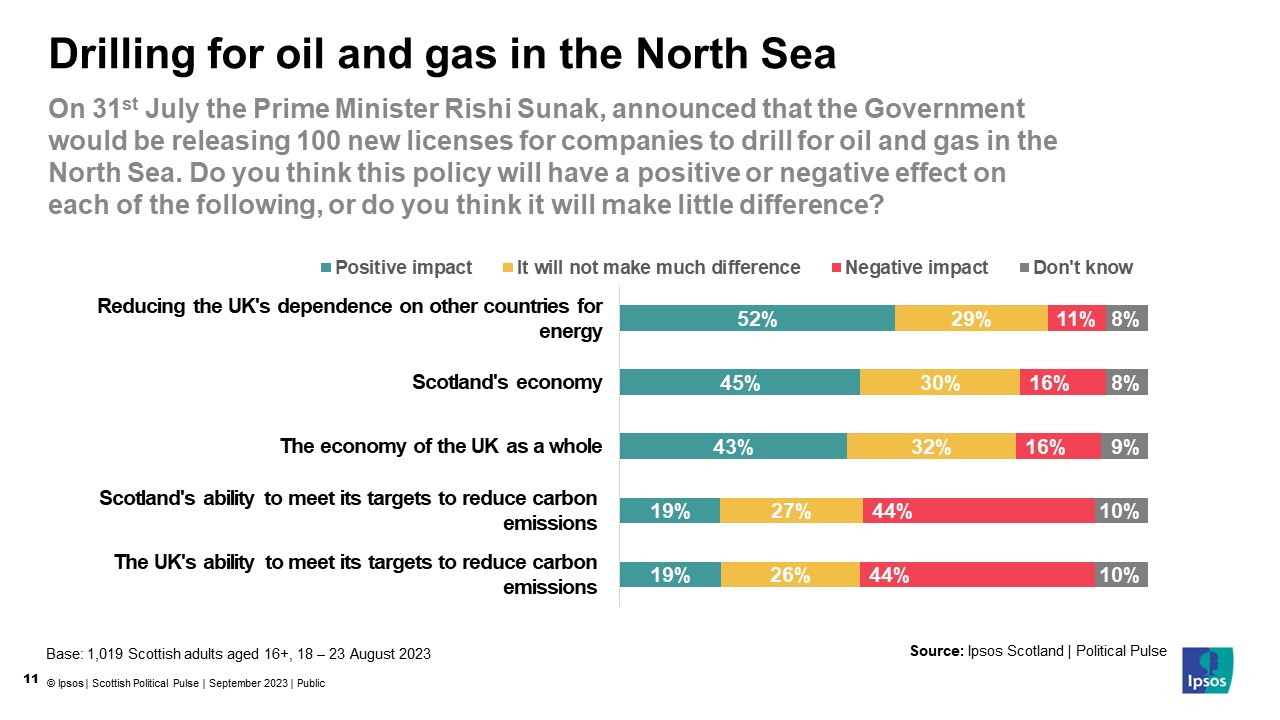Half of Scots expect positive energy security impacts from new North Sea oil and gas drilling licences
New polling conducted by Ipsos Scotland finds that:
- Scottish public support for improving the energy efficiency of homes and businesses (84%) and investing in renewables (82%) is high – and higher than it is among the British public overall. Views on investing in nuclear energy are less positive, though more support this (45%) than oppose it (27%).
- Half (52%) of Scots think the UK Government releasing 100 new licences for oil and gas drilling in the North Sea will have a positive impact on reducing the UK’s dependence on imported energy.
- Nonetheless, climate concern remains high – 77% say they are concerned about climate change, including 35% who are very concerned.
Views on measures to reduce the UK’s reliance on imported energy
Looking at steps the UK could take to reduce its carbon emissions, public support is strong for improving the energy efficiency of homes and businesses as a way of reducing how much the UK relies on imported energy, with 84% supporting this approach and just 3% opposing it. Support for investing more in renewables is also high - 82% support and 6% oppose this. The public are less positive about investing in nuclear energy, although on balance more support than oppose it (45% support, 27% oppose).
The Scottish public are split on whether the UK should restart or increase its own production of fossil fuels. Over a third (38%) say they support this, while an identical proportion (38%) oppose it, and 23% are unsure. Most Conservative voters support the UK restarting or increasing its own production of fossil fuels (64% support, 14% oppose). In contrast, Labour voters are divided on this question (44% support, 34% oppose), and SNP voters are more likely to be opposed (29% support, 48% oppose).
The Scottish public are slightly more likely to support renewables and improving the energy efficiency of homes and businesses than the British public overall are. They are also a little more likely to oppose investing more in nuclear energy or re-starting or increasing the UK’s own production of fossil fuels, compared with the British public.
Support falls slightly for each of these energy security measures if it was to lead to an increase in energy bills or taxes. However, more of the public still support each of these measures than oppose them, even if they meant an increase in bills or taxes.

Impacts of further drilling for North Sea oil and gas
Following Rishi Sunak’s announcement that the UK Government would release 100 new licences for companies to drill for oil and gas in the North Sea, over half (52%) think this policy will have a positive impact on reducing the UK’s dependence on imported energy. Conservative and Labour voters are particularly likely to think this (83% and 66% respectively), while SNP voters are more divided (37% think it will have a positive impact, while 40% say it will make no difference and 14% expect it will have a negative impact).
More than 4 in 10 think this policy will have a positive impact on Scotland’s economy (45%) and the UK’s economy (43%).
Climate concern is high among Scots, with 77% saying they are concerned about climate change. While the public expect positive impacts from this policy for the UK’s energy security and economy, on balance they also expect it to have a negative impact on the climate. Over 4 in 10 (44%) think the policy will negatively impact Scotland and the UK’s respective abilities to meet their carbon emissions reduction targets, while 19% say it will have a positive impact.

Emily Gray, Managing Director of Ipsos in Scotland, commented:
When it comes to the future of energy, tackling climate change is important to the public, but so too are affordability and energy security. These new results from Ipsos highlight the importance the public place on energy security, with more than half of Scots thinking new oil and gas licences will help reduce the UK’s dependence on other countries for energy. The public recognise there is a trade-off, with more expecting this policy will have a negative impact on meeting carbon reduction targets than thinking it will have a positive impact. And there are stark differences by political party support, with Conservative voters more likely to support the UK restarting or increasing fossil fuel production than to oppose it, Labour voters more split, and SNP voters more likely to be opposed.
Technical note
- Ipsos interviewed a representative quota sample of 1,019 adults aged 16+ in Scotland.
- The survey took place online between 18th and 23rd August 2023.
- Data has been weighted to the known offline population proportions.
- Where results do not sum to 100%, this may be due to computer rounding, multiple responses, or the exclusion of “don’t know” categories.
- All polls are subject to a wide range of potential sources of error.



